Michael Italiano is the performance coach for McLaren Formula 1 driver, Daniel Ricciardo. Michael is actually childhood friends with Ricciardo but being his performance coach was not something he expected when he left school.
Michael studied civil/structural engineering and worked for a mining firm in his native Perth for seven years. But one day, he decided he needed a change.
“I asked myself if I’d be happy sitting in the same office in ten years’ time, even if I did get a promotion, and the answer was clearly no. I didn’t want to be in an office all day, every day, nine to five.
“I decided to follow my passion and my passion had always been health and fitness.
“I was quite lucky. It was quite clear what direction I wanted to go in. But it also took time. It wasn’t something I just figured out after school. I was in the workforce for nearly 10 years before I decided on it.
“For anyone reading, teenagers or adults, worried about not working it out, it’s actually ok. I always thought I’d have it worked out by the time I left school but it’s not the case. You’re still young, you’re still trying to figure out what you enjoy. That’s how I started, and I haven’t looked back since,” he said.
Michael's Journey Through Career Change
Michael took the leap and retrained as a personal trainer, specialising in strength and conditioning. Before taking to Formula 1, he worked with several athletes across multiple sports including MMA, golf, rugby, and football.
His work didn’t go unnoticed by those around him. He did some leisurely training with Ricciardo whenever he came back to Perth. And then, at the end of the 2017 Formula 1 season, he asked Michael to join him as his performance coach in F1.
It was an offer that he quickly accepted, and he entered the world of Formula 1 motorsport. It was a lifestyle he says took a good deal of adjustment.
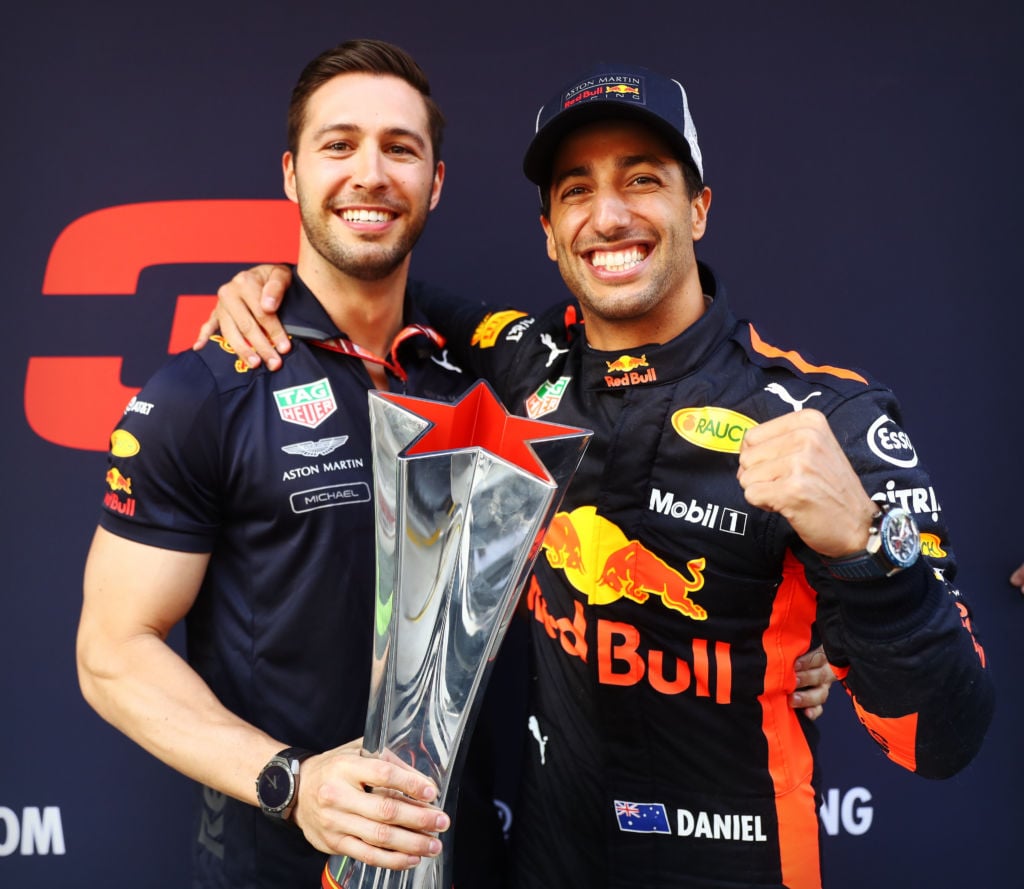
Michael and Daniel at Red Bull in 2018. Credit: ThePitCrew
“It’s fast-paced. It takes a while to get used to. The first year, I got a little bit homesick after three months. It’s a big transition.
“You’re living out of your suitcase. You’ve gone from a normal routine to almost no routine. You’re in transit every seven days. It takes an adjustment.
“Throw Covid in there for two years and that just made it an even bigger adjustment.
“I’ve now been with three teams also, so there’s even more adjustment there. You start to get used to how particular people, personnel, and teams operate and then you’re off to the next team and you have to learn that all over again and learn new names, which I’m absolutely terrible at. Thank God at McLaren, we actually put our names on our shirts,” he said.
Michael has been with Daniel at three of his teams thus far. Red Bull Racing, Renault (now Alpine), and his current team, McLaren.
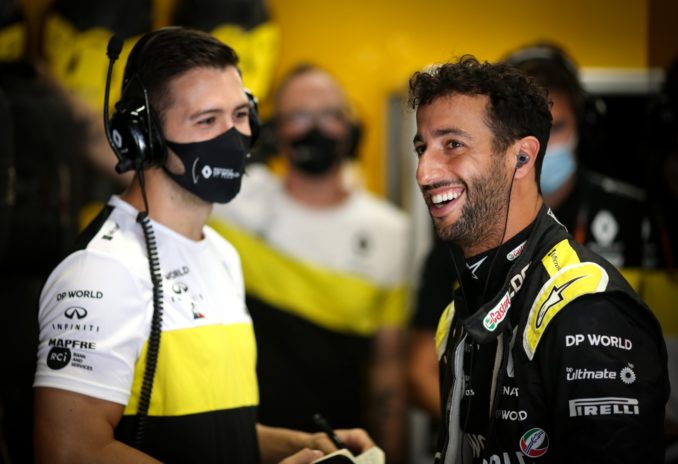
Michael and Daniel with Renault in 2020. Credit: Michael Italiano
Beyond being the performance coach for one of the most popular drivers in the sport, Michael was also thrust into the public eye through repeat appearances on the hit Netflix documentary show, Drive to Survive.
The show goes behind the scenes of the lives of F1 drivers and team personnel. While acknowledging what it has done for the sport, Michael admits he’d prefer less camera action.
“When I started in 2018, that was the first season of Drive to Survive.
“If I had my way, I’d prefer if there were no cameras. That way we can just get our job done and it makes my job easier. Fewer distractions, fewer commitments for Daniel. I’d just do my job as a coach. In saying that, that’s not me having any negative opinions of the series. The series has been amazing for outreach, exposure, and teaching people what Formula 1 is about. It’s getting a lot of people into Formula 1. It’s very exciting. I think what they’ve done has been great. Daniel just doesn’t stop talking so they love it,” he said.
What is it like to be a Performance Coach?
As mentioned above, before working with Ricciardo, Michael worked with athletes from multiple different sports. He points to a number of ways in which Formula 1 is unique to those he has worked with previously.
“Definitely the focus on the neck. There’s a lack of research on neck training.
“There’s a lack of research in S&C in motorsports in general. I think that’s what makes the sport so unique itself. You can grab principles from other sports and principles from sports science and apply them to F1 athletes but in a way, there’s a bit of trial and error as well.
“For me it’s exciting. It’s a great way to find out the best way to train these athletes. If you do a great job, because it’s such a niche sport, it’s very rewarding.
“I think that’s what makes it the most unique. The neck training and the lack of research and knowledge on how to train a driver. It makes it exciting to try and knuckle down and figure out a way to be that guy. It’s almost like cracking a code,” he said.
One thing that sets F1 apart as a sport is the varying levels of physical exertion that drivers go through over the course of a session. One of his key responsibilities is to train Ricciardo’s body to react to each and every one.
“You got the obvious one, which is the G force. G force is from the actual car. Turning, cornering, braking, acceleration. G force is exerted on the body but in particular the neck, which is why we have to keep the neck so strong.
“You also have the climate. The impact of the environment. These guys are in fire-resistant suits. Thermal regulation of the body is quite difficult. The ability of the body to cool down is reduced, because of these suits, you’re right next to the engine, the asphalt. That can cause fatigue and dehydration. That’s a big physical factor.
“You’ve got the vibrations of the car. The body is fighting that. You’re in an isometric hold. Your muscles are under tension for 90 minutes. You need to have very good muscle endurance.
“You need cardiovascular endurance as well because the heart rate is high because of all the factors I’ve just mentioned.
“You also need great concentration, and optimal cognitive ability in order to race well, defend well, make quick decisions, using the 20 odd buttons on your steering wheel. It’s insane skill that I hope people recognise,” he said.
The Formula 1 season is long and goes around the globe, from Baku to Brazil, Austria to Australia. While the travel is intense, Michael says that race weeks tend to take on a similar structure.
“Usually, we’ll fly in on a Wednesday. We flew in [to Barcelona] yesterday, and landed at about six o’clock. Chilled out, trained the neck a little bit. Had a nice dinner because it’s probably the quietest night you’re going to get for the next four nights.
“Thursday, you’re at the track, setting up. Setting up the race room. Getting supplements ready, getting the massage bed set up, getting the massage gun charged up, and making sure I have all of the uniforms set out and ready to go. I’m just preparing for the weekend. On Thursday, Daniel has got media most of the day. I’m with the chefs as well, sorting out his meals for the week and the timings. That’s Thursday pretty much. It’s quite relaxed. We were in here at 11 today. We’ll probably get out around seven. It takes me two or three hours to set up. I can sit on my laptop and do some work.
“Friday, we have two practice sessions so it’s usually the longest day at the track. I’m warming him up before each session. We’ve got two sessions so I’m making sure he’s staying hydrated before and after, getting his meals in, and that everything is running smoothly for him.
“Pretty much the same on Saturday. Preparing him for FP3 and Qualification. Hydration, nutrition. We’ll do some reaction training to warm him up for Quali. It’s a little different for Quali, different practices.
“Come Sunday, race day, it’s pretty much the same. Waking up, making sure he’s drinking early upon rising. Get to the track, prepare everything. We get a good warmup in. We’ll talk a little bit about strategy, where his head's at, some visualisation, getting into the zone and getting the right intensity. When the lights go out, I’m sitting in the garage with a notepad, taking notes based on Daniel’s performance. We have a debrief either that night or the next day,” he said.
Michael has been with Ricciardo for four and a half years now and in that time, he has seen some memorable races from his mate.
“Obviously the wins are hard to go past. Shanghai was an amazing win. That one was special because it was my first win with him, and his engine blew in FP3. The team did a super job and only just got the car out for Quali with minutes to spare. I think he qualified as P6, and I think Max was P3 or P4. He was a bit bummed because he thought he had the pace and Quali was so rushed. We went out for dinner that night and I said to just go into the race and enjoy himself. He started P6 and went through the field and it was awesome.
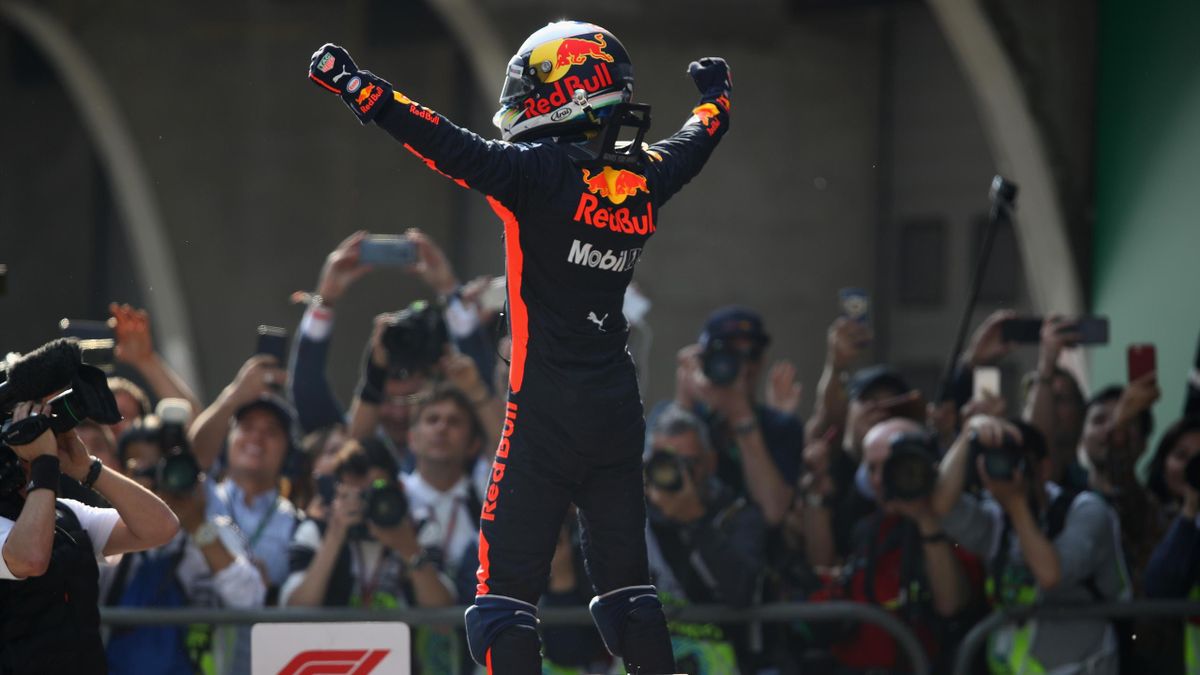
Ricciardo celebrating his win in China in 2018. Credit: Eurosport.
“Monaco and Monza of course. The way he topped the timesheets in Monaco in every session it was a pure dominant weekend. That was probably the most I’ve been nervous actually. Especially when the engine started to have issues, I wasn’t sure if he would make it to the chequered flag.
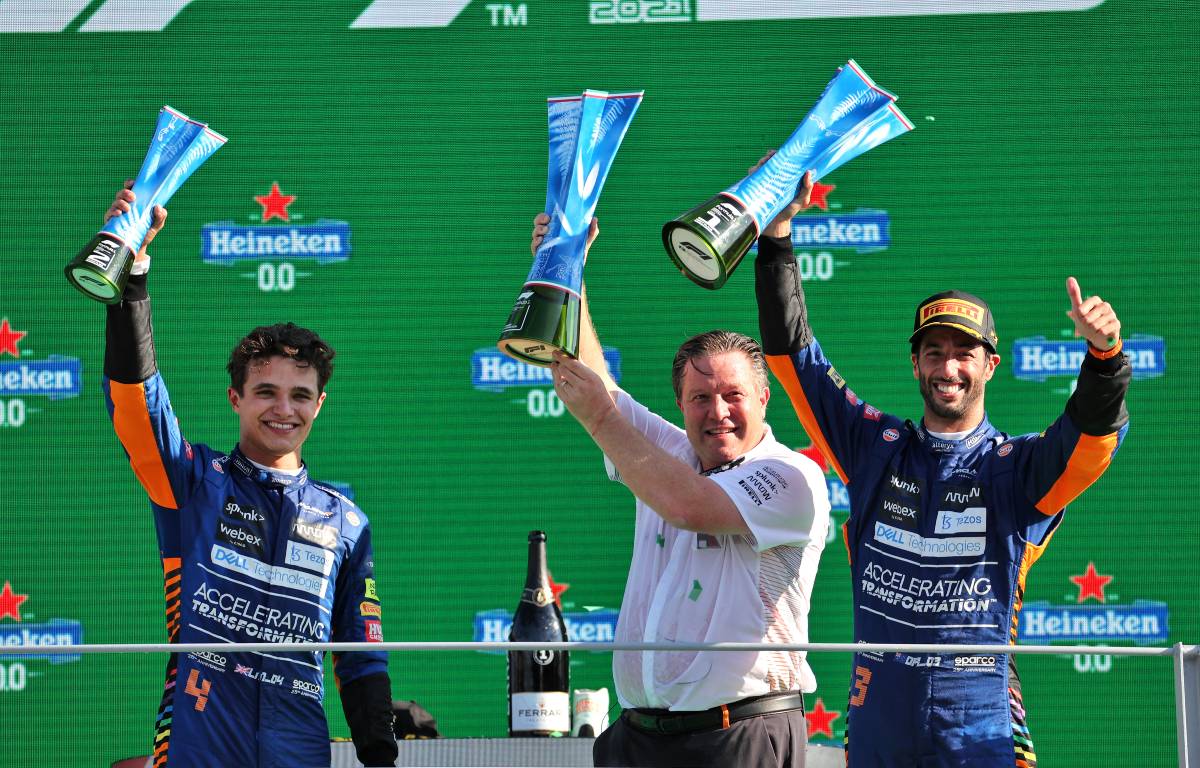
McLaren's Lando Norris, Team Principle, Zak Brown, and Daniel Ricciardo celebrate a famous win in Monza in 2021. Credit: Planet F1
“Besides the obvious ones, the wins, his pole position in Mexico was really cool. He was behind Max for most of the weekend. He really surprised some people and put it together in that last run and absolutely nailed it. The race didn’t go well, he had a retirement. But just the way he went about Quali and nailed the lap and got his first pole position away from Monaco was cool. It was special. He did it against the odds,” he said.
Those familiar with Formula 1, and with Daniel Ricciardo, will know that he has a rather unusual way of celebrating a race win or placing on the podium.
The ‘shoey’ has been a part of his celebrations for as long as the Aussie has been in F1. It involves Ricciardo taking the champagne he is presented with on the podium and pouring some into his shoe. Yes, the shoe he had just been wearing during the race. He then drinks the champagne from the shoe.
Over the years, Ricciardo has gotten many people to join him in a shoey, including Lewis Hamilton and current McLaren teammate, Lando Norris. Thus far, Michael has been able to avoid the shoey but says his time will come soon.
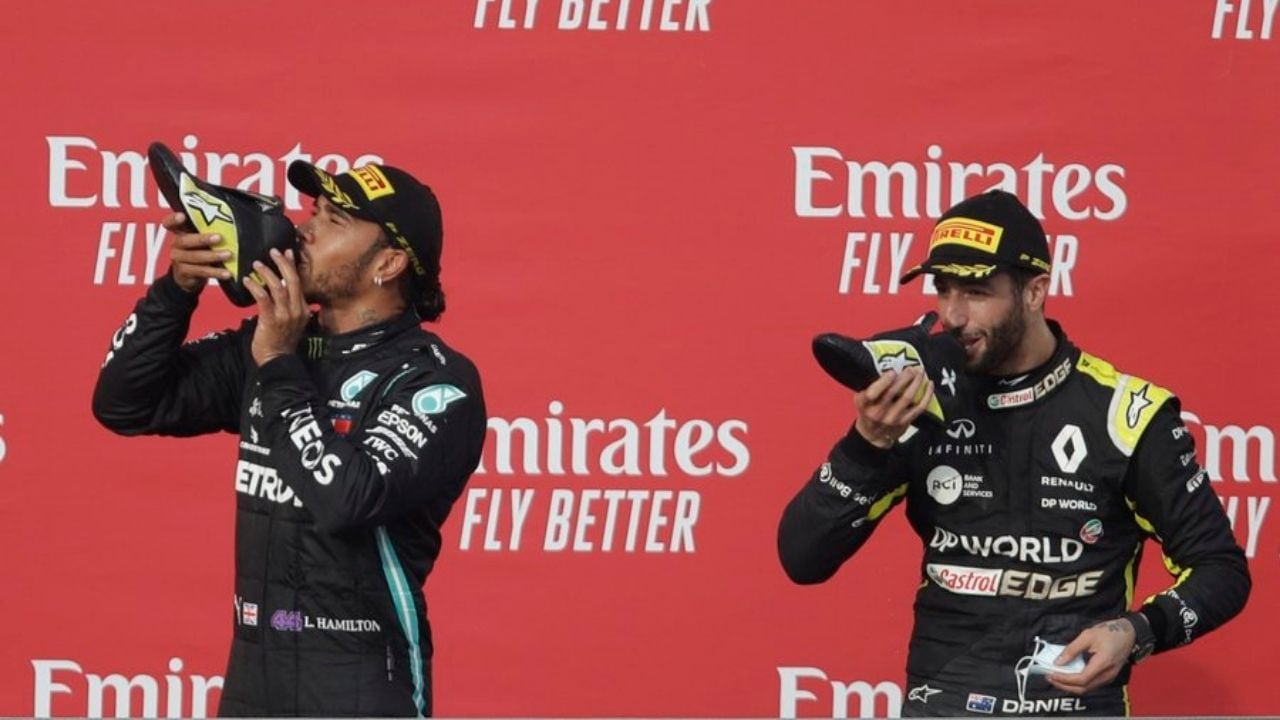
Lewis Hamilton and Ricciardo do a 'shoey' after the Emilia Romagna GP in 2020 Credit: The Sports Rush
“He has not [asked me] yet, and I say yet. I don’t want to be drinking out of his shoe that’s for sure. Maybe, one day, because if I’m drinking out of his shoe it means he’s either on a podium or he’s won a race. I won’t say no to it,” he said.
It’s been an enjoyable four and a half years for Michael and for him, he is simply taking each day as it comes.
“I don’t like planning ahead. Life goes past quick enough.
“If I had to answer the question right now, I’d love to stay in Formula 1 for sure. I love the sport, I love what it’s about, it’s a cool lifestyle.
“If I had to part ways with Formula 1, I’d love to move into the American sports, NBA or NFL. I love those two sports. I actually really like tennis as well. They may be three areas I dive into,” he said.
Michael is someone who followed his passion. He recognised that he was in a career that he didn’t want to be in for the rest of his life, and he found something he preferred much more. While he acknowledges the challenges associated with it, he encourages anyone else to do the same.
“I think my answer would definitely be biased because it worked out so well for me, in my opinion.
“I understand why people say to follow your passion. As soon as I did that, I started enjoying working. It didn’t feel like work. It felt like a choice. I had friends ask me why I would work Saturday and Sunday. I did it because I chose to. Because I loved doing it.
“I understand why people say follow your passion because it is enjoyable. It doesn’t feel like work, it’s not forced. In four and a half years I don’t think I’ve ever woken up and said I don’t want to go to work. I’ve woken up excited and ready to go to work. It’s an amazing feeling. It's a unique feeling.
“If people are wondering should they follow their passion, there are things to consider. Maybe, from a financial perspective, you won’t be as well off at the start. I definitely wasn’t. I left a very good job and very good pay. There were times that I was grinding away. But if you’re really passionate about something, you make it work, because you want to make it work.
“All I’d say to people is that, if you’re going to follow your passion, it's not going to be easy initially. But I do feel like, in the long run, you will be happier.”
You can learn more about Michael and the work he does on his website.
Read More
#FollowYourPassion – How an Ice Hockey Player Became a Formula 1 Performance Coach
Get in Contact
If you are interested in any of our sports courses or have any questions you can book a consultation call with our expert sports advisor Jo Shaw here, email jo.shaw@portobelloinstitute.com or call 01 892 0024.



-1.png?width=1200&name=Colms%20Sports%20Article%20Feature%20Images%20(10)-1.png)
-1.png?width=352&name=Colms%20Sports%20Article%20Feature%20Images%20(11)-1.png)
